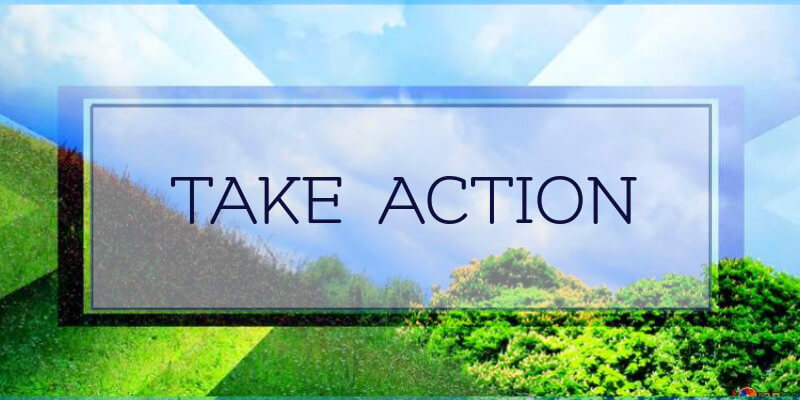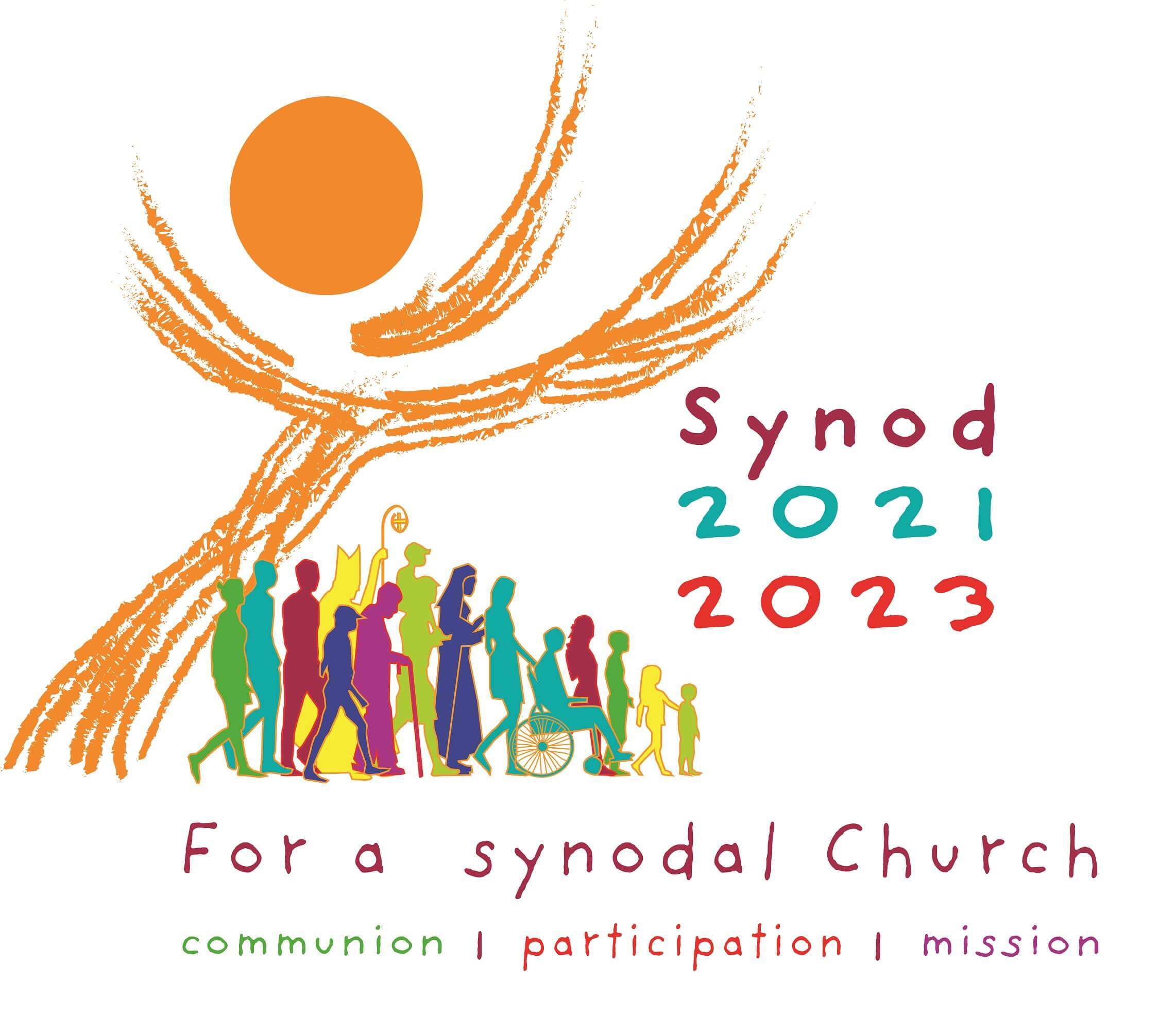Shortcode
End shortcode

Women’s Cornerstone
Daily Rosary | Divine Mercy Chaplet | Eucharistic Adoration | Stations of the Cross

Men’s Cornerstone

Parish Picnic

Bereavement Ministry

Parish Picnic

Parish Picnic

Red Sample

Parish Picnic
Ed. Ginter
Spring Concert | Christmas Concert | Presentation MTV |
Piano Men

Parish Picnic
Question no. 9: What can we do in our homes to nurture and care for Creation?
There are many things that we can do in our homes that are signs of our caring for creation. A good first step is to talk with your family about their concerns for creation and decide upon things you can do to help heal the Earth. There are no efforts too small or too insignificant. You are probably already taking some action to help nurture and care for creation, like participating in your town’s recycling program and turning off lights, computers, and electronic appliances when not in use. But there are other things you may consider too.
Eco-Friendly Products – Using eco-friendly cleaning products in your home reduces your family’s exposure to toxic substances and lowers the amount of toxins entering the local water system. Look for products that are biodegradable and do not contain solvents and phosphates. Learn more about the harm that conventional household cleaning products can do to the Earth and to your family’s health. See the following websites or do your own search on the internet:
- http://www.organicconsumers.org/articles/article279.cfm
- http://green.wikia.com/wiki/Toxins in Household Cleaning Products
- http://life.gaiam.com/article/whats-so-bad-about-chemical-cleaning-products
Most supermarkets carry some eco-friendly or natural cleaning products. Be sure to read the labels for what the products contain. The best and most reliable products for not damaging the Earth or your health are produced by companies like: Seventh Generation, Earth Friendly, Sun and Earth, Mrs. Meyers, Gaiam, SimpleGreen, Method, and Ecover.
Reusuable Products – Manufacturing products such as paper towels, napkins, and paper and plastic bags requires natural resources, and their disposal adds to environmental waste and pollution. Use paper towels sparingly and replace them by using cloth towels to clean up around the kitchen. Use cloth napkins for family meals and try to limit the use of paper napkins. Whether paper or plastic, stop using disposable bags when shopping; use reusable bags instead.
Energy Review – Walk through your home to conduct your own energy “audit.” You can find suggestions at www.energysavers.gov. Adding insulation and sealing windows and doorways will keep your home warmers and save energy thereby reducing costs and carbon emissions. Use energy-efficient light bulbs and when purchasing appliances, choose energy-efficient ones. Change to a renewable energy supplier through PSE&G or O&R. It is easy, the cost is about the same and it makes a big difference for the environment.
Water Conservation – Clean, potable water is becoming increasingly scarce in the Unit3ed States and especially worldwide. There are ways that we can save water. Try taking shorter showers. Be sure to run the dishwasher only when it is full. And don’t water your lawn as often.
Heat Control – Turning down the heat just a few degrees not only conserves energy, it reduces carbon emissions and saves money. Similarly, you may consider washing clothes in cold water to save heat as well.
Explore and search the internet for many more ideas for how you and your family can care more for creation and help create a more sustainable environment for ourselves and future generations. Here are some websites:
- http://ecosimply.com
- http://www.practicalenvironmentalist.com
- http://www.supergreenme.com
- http://globsalstewards.org
- http://www.caring-planet.com
Questions for Discussion:
1. What are some of your own personal practices and suggestions you find most effective for caring for creation?
2. What other recommendations would you add to the list above?
3. Has the reading of this booklet helped you to become more aware of the religious and moral implications of caring for Mother Earth?
Question no. 8: What can we do at our parish to nurture and care for Creation?
Tempting as it may be to begin by creating a list of possible activities what is really of major importance is raising the consciousness of parishioners to the environmental issues and challenges of our times. Before “doing something” we need facts. We need to be educated in understanding how intimately we are connected with Mother Earth. At the same time, we need to recognize that we are also the very ones who are contributing to the devastation of her vital resources.
We need to be formed in new attitudes and behavior patterns for sustaining a healthy and viable Earth. Parishioners would begin to recognize that protecting the environment is a religious matter that has moral and ethical implications. Only then will we see that we have moral responsibilities for taking specific actions. Such initiatives will involve us personally as individuals and as members of a parish community. Caring for God’s good Earth is part and parcel of our Catholic faith.
Education will include different approaches for becoming more informed about environmental issues and new ways of sharing that information with one another. Many worthwhile resources are available today on the internet, as well as attractive and well-researched films, DVDs, and study programs for parishes and appropriate sharing discussion materials for Small Christian Communities. Enlightened education dispels false myths.
(NCR Article on Presentation for Green Faith)
For this reason, it would be very helpful for parishioners to become acquainted with recent papal and Church statements, Catholic social justice principles, and biblical insights on the environment. The connection between faith and ecology could also provide a promising subject for discussion and action with sister parishes of our deanery in the New Energies Project promoted by the Archdiocese of Newark.
Once having established an appropriate educational and formational base, then workable action plans, best suited to the culture and capabilities of our parish, will follow. The parish has already undertaken a number of excellent initiatives like solar panels on the roof of the church, eco-friendly and energy-efficient bathroom facilities, lessening the use of Styrofoam and plastic water bottles and the installation of beehives on church property.
We have completed the necessary criteria and guidelines for full accreditation in the GreenFaith Certification Program and have been named a GreenFaith Sanctuary. Other initiatives are in process:
- A parish wide recycling plan
- An ecological assessment and review of our building, plant, and grounds
- Calculation of our parish “carbon footprint”
- Substitution of water pitchers for plastic bottles at parish meetings
- Becoming more informed about the privatization of water
- Use of compact fluoride light bulbs through the parish plant and rectory
- Inventory of materials used for cleaning in the parish and pesticides son parish property
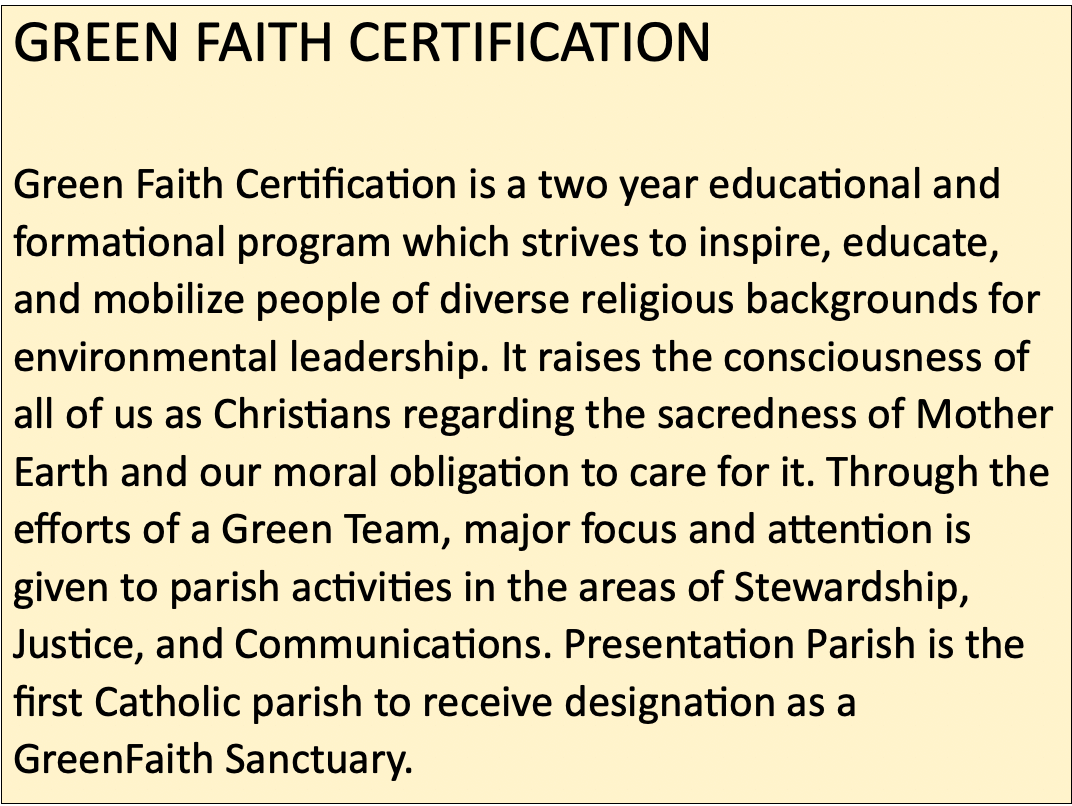
Perhaps one of the most challenging personal recommendation for all is that we try to adopt a lifestyle that is more consistent with the suggestions already made, i.e. one which is based on simplicity, moderation, and personal disciple. This is truly reflective of the Gospel teaching and practice of Jesus. While we have been greatly blessed by the rich resources and bounty of our nation, we must also confess that it is often our consumer-driven ways that result in the impoverishment of those whose natural resources are being overused or even destroyed. A statistic that should shock all of us is that of the seven billion people in the world today, one billion live on less than two dollars a day.
How much of that is attributable to an over-indulgent use of the natural resources of our land to the detriment of the poor and disadvantaged? A slogan of three words may be helpful: REDUCE, REUSE, RECYCLE.
Questions for Discussion:
1. In your opinion, what is the best way to raise the consciousness of parishioners to the importance of environmental issues and to ways of dealing with them?
2. Why do you think there is resistance on the part of some people when there is mention of any discussion about religious responsibilities, or even moral implications of environmental issues?
3. In what ways can we change our lifestyles to offset the excessive or unreasonable use of our natural resource like, oil, water, or electrical energy?
4. How has the reading of this booklet helped you become more aware of the religious and moral implications of caring for creation?
The Holy Spirit – The Lord, the Giver of Life: Five-Week Faith Sharing Sessions begin on June 3
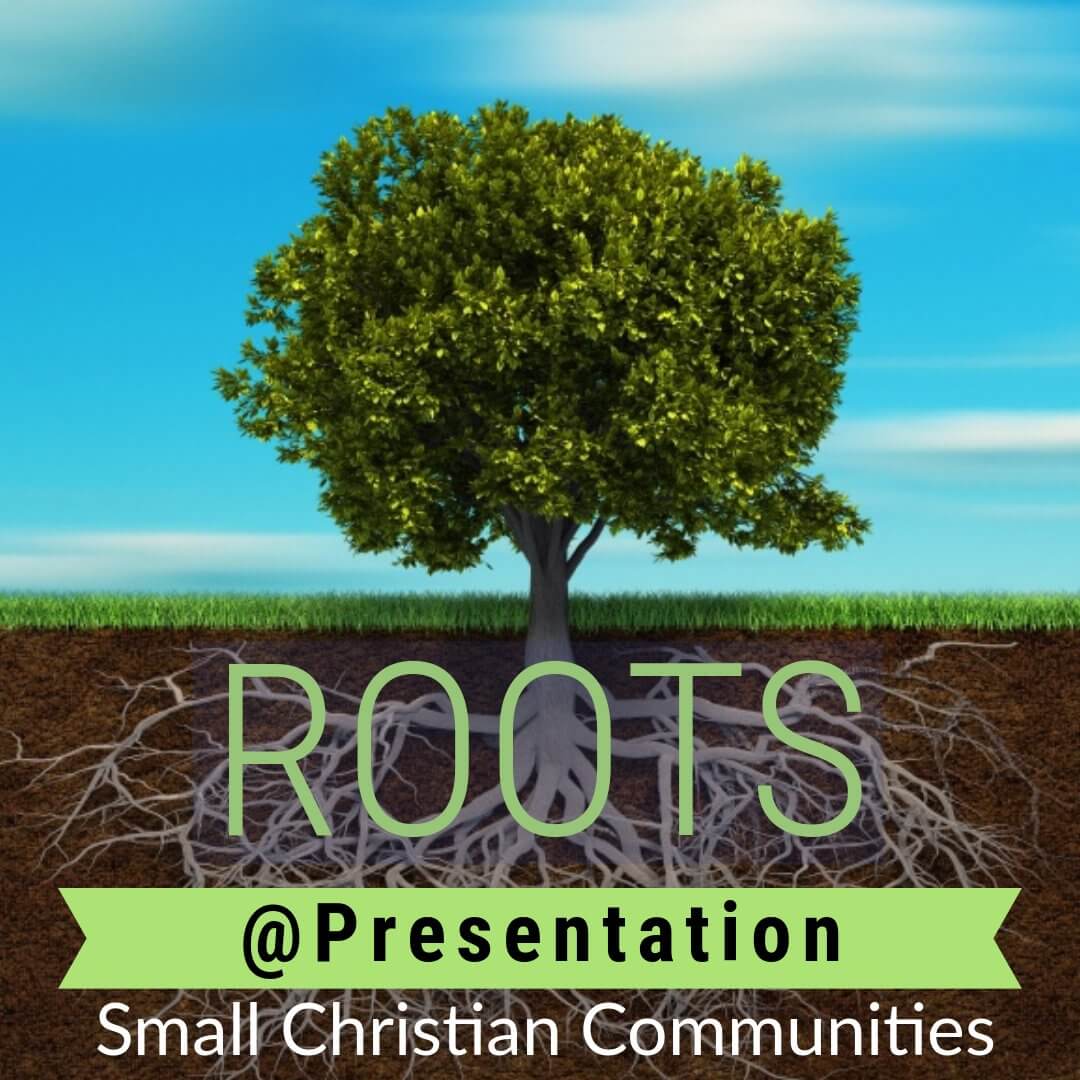
Roots@Presentation, our Small Christian Communities, invite you to participate in a virtual 5-week faith sharing Session on the Holy Spirit. Join us on Wednesday mornings at 10am beginning on June 3.
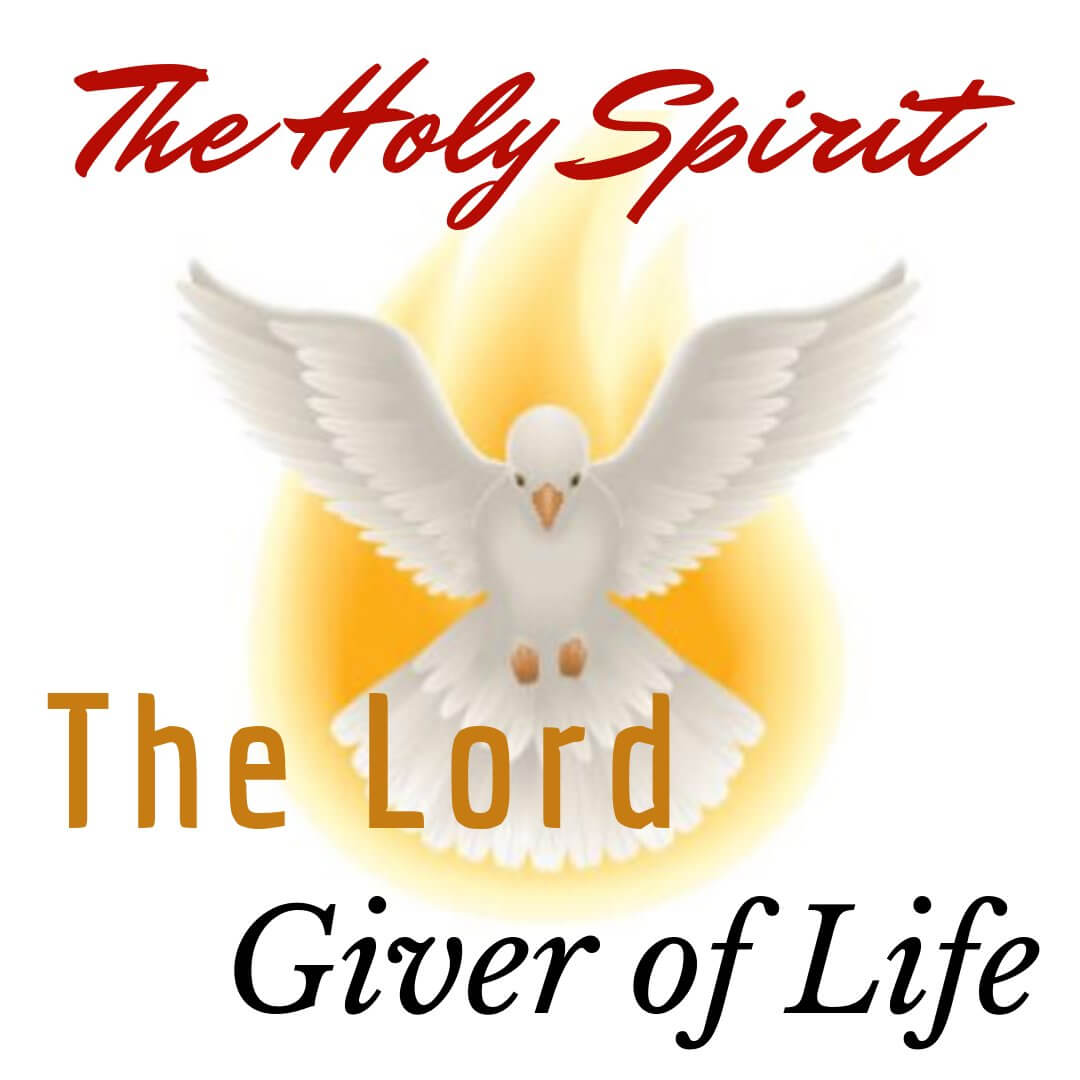
If you are interested, please register by May 27 and we’ll send you the Zoom link.
We hope to see you!
Let your roots go down to Him,
Collossians 2:7
and let you lives be built on Him.
Then your faith will grow strong in the truth you were taught, and you will overflow with thankfulness.
New Bereavement Groups: Beginning the Week of June 15
In response to the current health crisis, we will be offering
new Bereavement Groups beginning the week of June 15, via Zoom meetings.
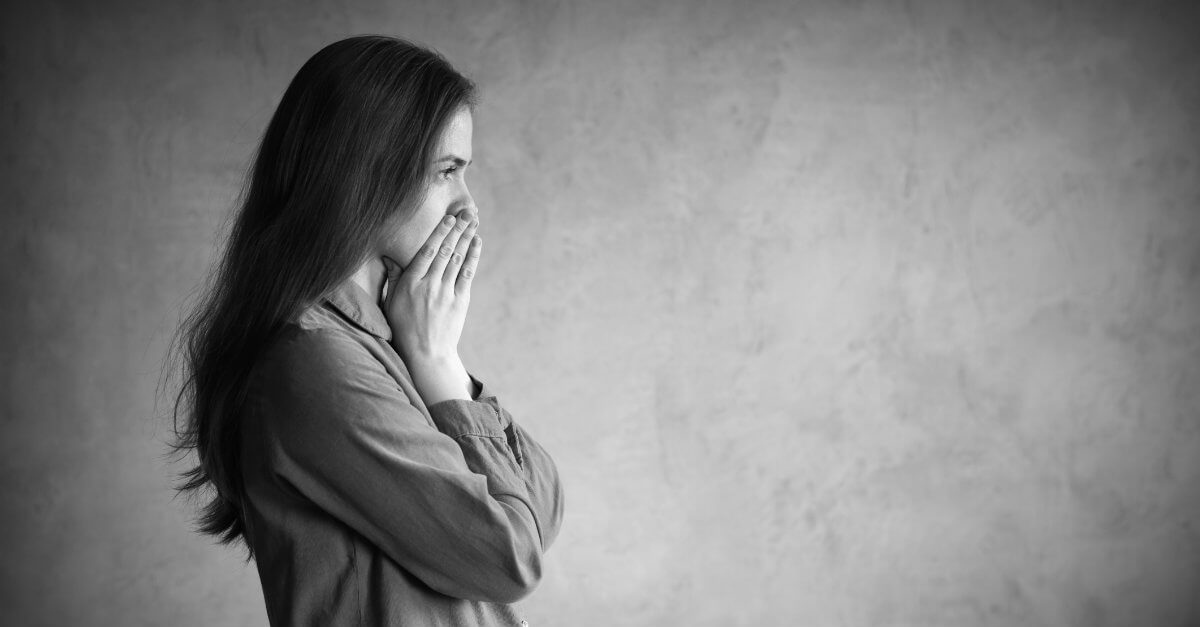
These groups are designed to help those who have lost a
loved one during this pandemic (whether from COVID-19
or other causes).

The Bereavement Team at Presentation would like to offer their support to help you at this most difficult time.
To register for a group, please click the box below.
You can also call 201-327-1313 ext. 872 and a team member will contact you shortly.
From the end of the earth I will cry to You,
Psalm 61:2
When my heart is overwhelmed;
Lead me to the rock that is higher than I.
Question no. 7: How do we understand the role of the Holy Spirit in Creation?
If Jesus Christ is the very core of our faith, then “doing the work of Christ” is what we are created for (i.e. making the power of God alive in the universe through the indwelling Spirit.) God evolves the work of creation and moves it to completion through the instrumentality of human beings. God’s creative Spirit, incarnate in the person of Jesus Christ, now takes flesh in and through the minds, hearts, and the freely-willed actions of people like ourselves. God’s Spirit is not recognized until it is embodied; it must take on matter.
The person of the Spirit, “the Lord and giver of life,” refers to God present and active in the world. From an evolutionary perspective, the Spirit of God, who hovered over creation from the beginning, continues to breathe within us and through us, drawing us to new creation.
The Hebrew Scriptures speak often of people like Moses, Elijah, Jeremiah, other prophets, and wisdom teachers as endowed with the Spirit. It was through the power of the Spirit that they proclaimed God’s message. For example, Isaiah spoke of a new age of the Spirit: The Spirit of the Lord is upon me, because the Lord has anointed me, to bring glad tidings to the lowly and to heal the brokenhearted, to proclaim liberty to the captives and release to the prisoners. (Isaiah 61:1-2)
“We can win the future,
Pope Benedict XVI
only if we do not lose creation.”
In the words and deeds of Jesus, his disciples recognized that he acted in the Spirit of God. When reading from the Scriptures in the synagogue at Nazareth, Jesus repeated the very same passage from Isaiah cited above. Rolling up the scroll, he handed it to the assistant, sat down, and then said: Today this scripture passage is fulfilled in your hearing. (Luke 4:16-21)
The dynamic symbols of change in the Pentecost experience (wind and tongues of fire) proclaim a new age of the Spirit, now embodied in the faithful followers of Jesus Christ. (Acts 2 ff.) Writing to the Corinthians around 54AD, St Paul reminds them, Now you are Christ’s body, and individually parts of it. (1Corinthians 12:27)
He challenges them to use their unique and different gifts of the spirit wisely, not for personal gain or self-aggrandizement but for the spiritual growth of the entire body. (1 Corinthians 12:27-28). In the end, there are three things that last: faith, hope, and love. And the greatest of these is love. (1 Corinthians 13:13)
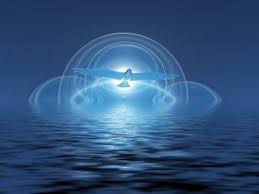
He challenges them to use their unique and different gifts of the spirit wisely, not for personal gain or self-aggrandizement but for the spiritual growth of the entire body. (1 Corinthians 12:27-28). In the end, there are three things that last: faith, hope, and love. And the greatest of these is love. (1 Corinthians 13:13)
It is we who are now called to be that “Body of Christ.” It is we who are now summoned as “co-creators and co-operators with God” in preserving and nurturing the wellbeing of creation. We are now the 21st century ”bearers of the Spirit.” To be a “co-creator and co-operator” with God in the work of creation means that by virtue of our present evolutionary stage of self-reflective consciousness, we are engaged in the evolutionary process that has engendered us. We have the capacity to look back into the past and marvel at the origins of the universe and recognize how we have evolved to this present stage of creation.
We can also see how our thoughtlessness and selfishness has diminished the life-giving resources of the Earth. We are also able to envision dire consequences for the future of our planet, unless someone speaks up. Would we be able to live with ourselves if we remained silent and did nothing about taking positive and realistic measures for a cleaner, healthier, and environmentally viable future?
Questions for Discussion:
1. As someone who was told in the sacrament of Confirmation that you are now a “bearer of God’s Spirit,” how would you explain, now as a mature person, your responsibility for preserving the life of Mother Earth?
2. What practical actions might you undertake in preserving the health and vitality of our Earth? What might you do in your neighborhood? In your home?
3. Does the term “co-creator” mean anything to you? Please explain.
Question no. 6: What is the relationship of Jesus Christ with Creation?
Jesus Christ is the very core of our faith and the ground of our belief and practice. The Holy Spirit dwelling within us is the active expression of that faith in word and action. Central to this belief is the truth that God became human in the person of Jesus to redeem the world. To say “the Word became flesh” (Incarnation) means that he was born of matter, having a human body like any one of us. He was like us in all things but sin.
The self-communication of God to the world in the person of Jesus Christ as a child of Earth is the linchpin that holds together the whole adventure of Christian faith.
Science tells us that human flesh, like that of Jesus and our own, was the result of a long, unfolding, evolutionary process. Like us, Jesus came from stardust. Like us, he shares the same genetic ancestry as bacteria, birds of the air fish from the sera, the great mammals, and the earliest forms of homo sapiens. Like us, he is kin with all of creation. This sharing of the natural world with Jesus confers a blessing not only on us, but on all of earthly reality. Indeed, matter is dignified by the presence of the earthly humanity of Jesus and endows it with a spiritual potency. Matter now becomes the bearer of God’s powerful spirit and the medium of new creation. What happened in a through the witness of Jesus Christ represents a new stage of what we are meant to become as human beings and what is intended for all of creation. Jesus Christ is the paradigm, or exemplar, of human life and of what we have the potential of becoming.
“We know that all creation is groaning in labor pains even until now; and not only that, but we ourselves, who have the first fruits of the Spirit, we also groan within ourselves as we wait for adoption, the redemption of our bodies.”
Paul to the Romans 8:22-23
The basic message proclaimed by the historical Jesus of Nazareth was the present reality of the “reign of God.” This message of good news is filled with countless examples drawn from the earthiness of a first century Palestinian milieu: grapes, thorn-bushes, figs and thistles, mustard seeds, and leaven.
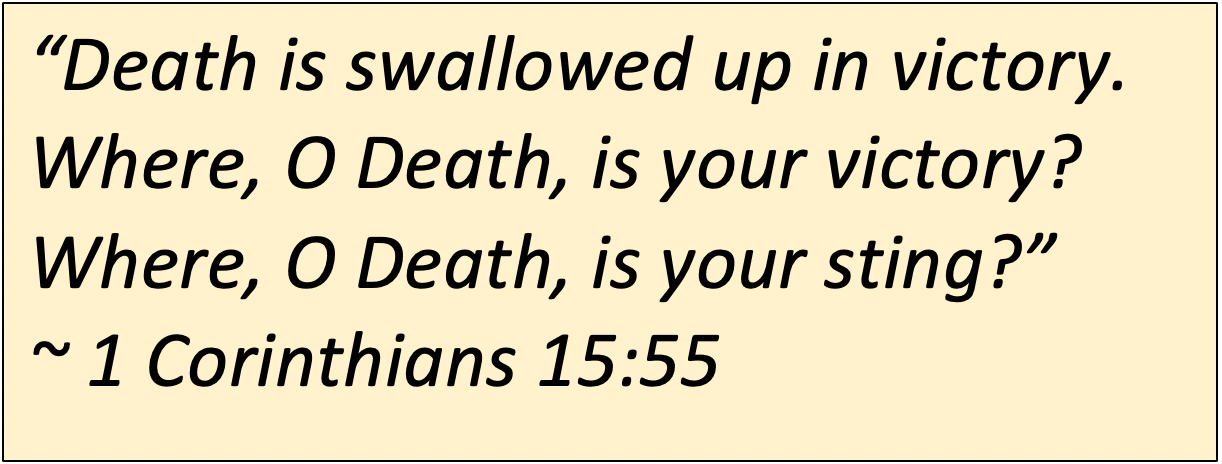
More specifically, “the reign of God” centered on the possibility of a new relationship between God and humankind and all created reality. To the followers of Jesus, his teaching and healing acts spoke of a new time of transformation, when those who believed in his power could be “made whole.”
For this reason, those who were broken or fragmented physically, be they paralytics, lepers, deaf-mutes, blind, lame, or sick in whatever shape or form, looked with hope for this “wholeness.” In his acts of healing, Jesus offered a foretaste and pledge of what “salvation” would really mean. The healings that were signs of the “the reign of God” were hope-filled experiences of a ‘wholeness’ that was not merely physical, emotional, and spiritual but a new reordering with all of created reality.
We cannot say that, at the time, Jesus was concerned with ecological issues of the 21st century. But his words and deeds gave witness to the merciful compassion of a God who cares deeply about giving new life and wholeness to the created world in all of its forms.
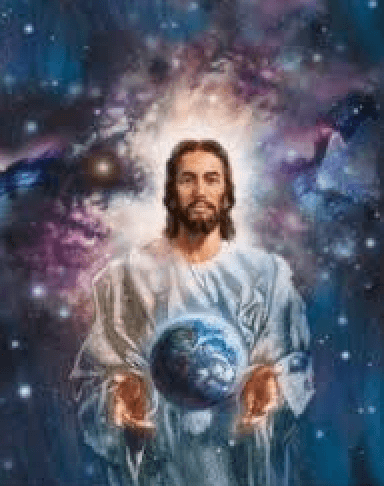
Since the “reign of God’ embraces all, says Fordham University theologian Elizabeth A. Johnson, then this includes the planet itself, its many different ecosystems and the creatures that inhabit them. In a sense, all of creation is redeemed or “made whole,” as it evolves to its final destination.
Furthermore, to recognize our created evolving world as an expression of God’s self-giving love offers meaning and rich spiritual insight into the death and resurrection of Jesus. Did Jesus have to die to make us “whole?” Is pain, suffering, and ignominious crucifixion the only way to show his redeeming love for the world? Is this what a loving God asks of his Son? No! Redemption could have taken place in a totally peaceful form. Jesus was not exempt from the evolutionary process of death.
However, the principal reason for his mission on Earth was not to suffer and die. Such an idea glorifies suffering. God doesn’t need to be placated. Death for Jesus is the price he paid for the faithful commitment to his mission of preaching the reign of God, which he did with full freedom, fidelity, and self-emptying love. Death is always a prelude to new life. No death; no transformation to new life. Death on the cross is the way in which Jesus Christ has chosen to enter into full solidarity with all who suffer, giving us therefore a profound example of how love always triumphs over death. Pain and suffering, even death itself, will be overcome by self-giving love. But, the victory over death is only one part of the mystery of life; the other side is the promise of a new, transformed life. The Paschal Mystery signifies that all of us are on a journey to God in and through the redemptive love of Jesus Christ. He is the tip, the touching point, and in biblical words, “the first fruits” of the evolutionary movement. What happened in Jesus represents the fulfillment of what we are meant to be as human beings. He assures us that the strivings of our human nature, our quest for genuine truth, our search for true love, and our desire for the fullness of life can be realized. His Spirit power has been with us from the beginning. It does not leave us when we die. The evolutionary God has imprinted upon all of created reality this profound message, Life is stronger than death.
Questions for Discussion:
1. What does it mean to say that Jesus Christ is a paradigm, or exemplar, of created life?
2. How would you explain that the cruciform pattern of creation (i.e. pain, suffering, and death) is also a pattern of Christian life?
3. How do you understand or explain the inevitability of death in your life? What frightens you about that idea? How do you best cope with it?
Question no. 5: How does Creation nurture our spiritual growth?
To speak of spiritual growth is to speak of relationships. For a Christian, spirituality is a way of life based on our relationship with God embodied in the person of Jesus Christ, whose life we now share through the Spirit dwelling within us. The Universe Story resonates with this conviction, insofar as it affirms that all of created reality, living and non-living, comes from a single source and has evolved for billions of years to our present stage of earthly existence. Creation is a web of relationships.
We humans, endowed with a mind capable of self-conscious reflection, a heart to reach out to others in love, and with the freedom to carry out the practical actions of both, are the living expressions of cosmic evolution which has come to present fulfillment. In the words of Abraham Heschel, a renowned Jewish philosopher/theologian, we are “Cantors of the Universe.”
Each and every one of us have evolved to this present stage of life as uniquely different, yet also connected with everything that has gone before us. Individually we sing a different song, but together we are a part of a vast choir of voices.
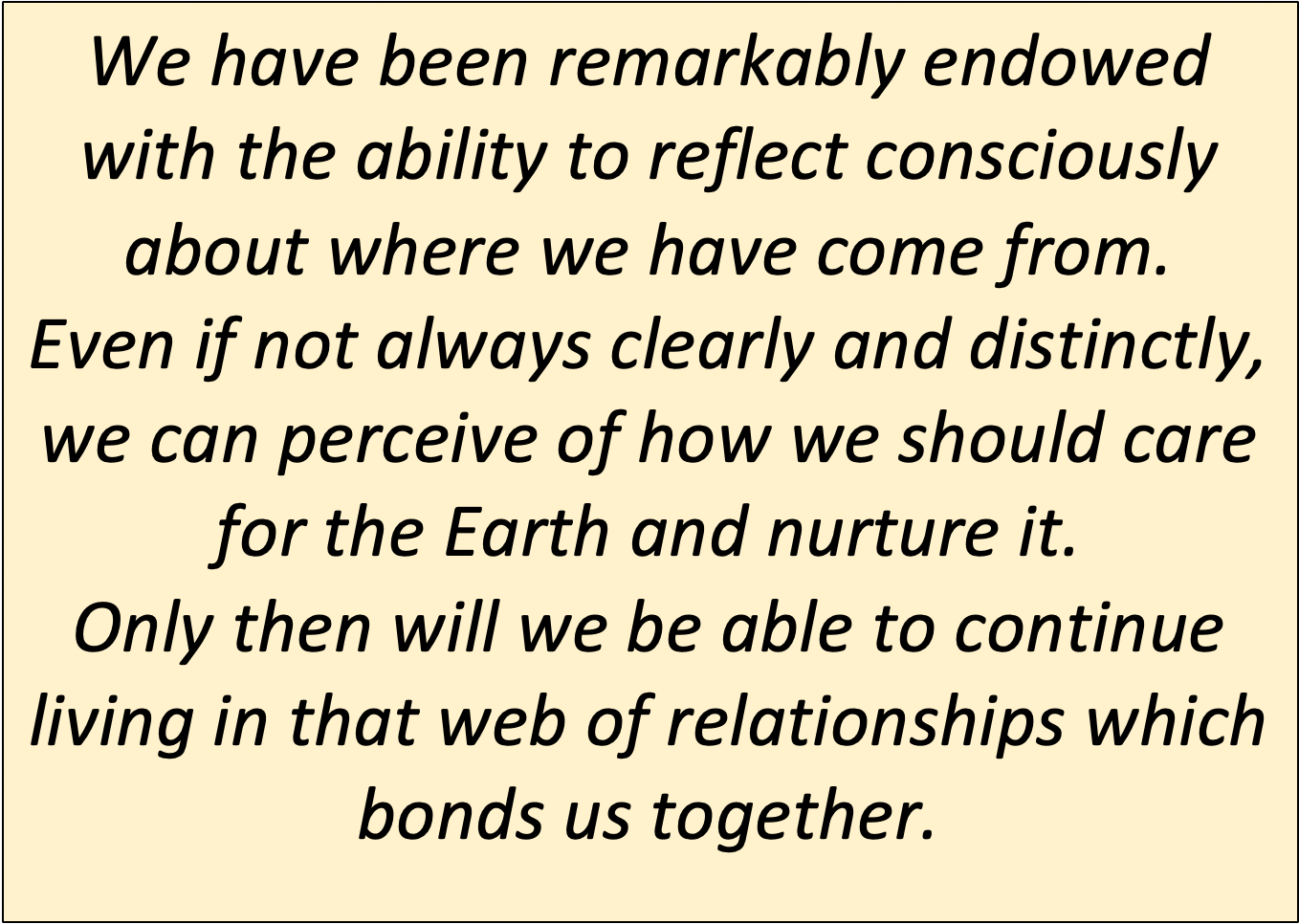
The first response of a believing person confronted with the beauty of creation is “awe and wonder.” Inevitable questions then emerge: “Who or what are you, Holy Mystery, that you have given us this wondrous Earth?” “Who is it that has endowed us with the freedom to enjoy and celebrate it, or to destroy it?”
Spirituality, first and foremost, begins with a profound sense of gratitude for this gift of Earth and life. This is our ho0me. Prayer of gratitude and thanksgiving is essential to a spirit-filled person.
Prayer continues with a sense of reverence for the sacredness of creation and a spirit of contemplation of how we are being called individually and communally to support and sustain the incredible kinship which gives meaning to our lives. Within the embrace of an immense evolutionary universe, we humans stand in reverent astonishment. The words of Karl Rahner, a renowned German Catholic Theologian, are apropos here: The Christian of the future will be a contemplative, or not at all! Furthermore, there is a. ridge between the Universe Story (where all created reality comes from a single source and has evolved to our present stage of earthly existence) and our own Story of Faith (where Creator God, Incarnate Son, and life-giving Spirit give meaning and purpose to the Universe Story).
Ecology comes from the Greek word, oikos, meaning home or dwelling. Ecology then is the study of the structure and dynamics of that intricate web of life that we call “our home.”
This link between both stories challenges us to be wise and responsible stewards and contemporary co-creators with God in working for an ongoing, livable, and sustainable future for our created world. It will depend on people like ourselves, committed to both stories, that will determine whether we leave for others a legacy of a living Earth, or a hell on Earth. What would this mean as a basic point of contemplation for our spiritual lives? If, as Abraham Heschel said, We are called to be Cantors of the Universe, what will we leave for the future?
Will we leave the memory of a magnificent choir or a cacophony of sounds? The evolutionary flow of creation in the Universe Story is also marked by a cruciform pattern of “birth, death, and new creation.” And so is the Story of Faith. The way of Jesus Christ is identified by a similar cruciform design: the total self-giving of himself on the cross. How does such a design manifest itself in our own spiritual lives? Such a pattern of life points also to the transformed life of the Risen Lord, the promise and hope for life even beyond death. May we who are endowed with the Spirit of Christ recognize that we, too, are being called to be co-creators and co-redeemers in continuing his mission on Earth. Such is the meaning of being members of the Body of Christ.
Questions for Discussion:
1. Recognizing that we, too, are part of that web of living relationships, how do we understand the words of Abraham Heschel, “We are called to be Cantors of the Universe?
2. When have you experienced in your own life the mystery and beauty of creation that leaves you with a sense of awe, wonder, and gratitude?
3. How do you understand the phrase referring to Creator God as “One who calls us into a communion of love?
Question no. 4: Why is it important for us to nurture and care for Creation?
As we become increasingly aware of our relatedness with all of creation and our total dependence on it for sustaining life, we are also witnessing serious ecological crises on all fronts. Unwittingly or not, we who are so intrinsically woven into the life-giving fabric of creation are also destroying it.
In our time humans have devastated wooded plains and valleys, polluted the waters, deformed the Earth’s habitat, made the air un-breathable, upset the hydrological and atmospheric systems, blighted green spaces, implemented uncontrollable forms of industrialization, humiliating the earth, the flowerbeds that is our dwelling. These are not the words of some deluded, anti-progressive naturalist but of Pope John Paul II speaking to Catholic Christians in a 1990 New Year’s message. His words are as relevant today as they were more than two decades ago.
In 1993, a UN sponsored international monitoring group published a report, The Millennium Ecosystem Assessment, backed by 1,360 scientists from 95 countries. This report contains what the authors call “a stark warning” for the entire world. They are words that make one think and think seriously, about the future.
Human activity is putting such a strain on the natural functions of the Earth that the future ability of the planet’s ecosystems to sustain future generations of humans can no longer be taken for granted.
These dire warning cannot be cast aside as hysterical, exaggerated claims of environmentalists. The research of more than 1,300 scientists can’t be dismissed. Other scientific studies corroborate these statements with statistics, regarding the destructive impact of climate change on island nations and other species. Today, no one denies climate change on our planet, although opinion about causes may differ!
In this 21st century, disputes continue over increasing demands for fresh water, even to the point of violence and the possibility of wart. The natural right to fresh water for all is being increasingly contested by major companies. Another area of concern is the depletion and over-harvesting of fish stocks.
Fish catches are merely one percent of what they were before the advent of industrial fishing. Some species of fish have been reduced to the point of extinction. In these examples of overuse and misuse of the world’s vital resources, Americans have to be reminded that we who represent five percent of the world’s population also consume twenty-five to thirty percent of the world’s resources.
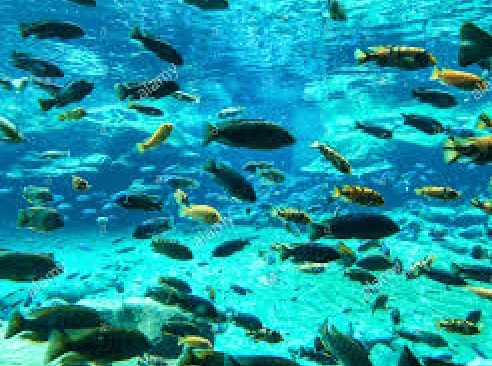
These realities are not exaggerated, nor are they meant to make us feel guilty. They are meant to make us more aware, to think, and hopefully, to act.
In light of such statistics, the reasons for caring and nurturing creation become obvious. If people like ourselves do not become more conscious of what is taking place here and now on this Earth that is our home and gives us life, who will? If we do not become more responsible and concerned about sustainable resources for the future, who will? If we as Catholics do not recognize that these environmental crises are religious concerns and give rise to moral issues that call for action, who will? If we do not take active, responsible steps in our own personal lives toward a better care for creation in the future, what kind of an environmental legacy will we leave for our children and our grandchildren? Will they bless us or curse us?
Questions for Discussion:
1. What ecological crises or problems have you recognized in your own surroundings? What steps did you take to deal with them? Were your actions effective?
2. What societal forces do you recognize that would prefer to turn a “blind eye” to environmental concerns in our society? How do you engage those who see no present problem with the health of the environment?
3.In what ways are you able to take responsible steps for the care and nurture of human and non-human creation?
Question no. 3: Why is the Church more concerned today about environmental issues than in the past?
In the past 40 years the Church has increasingly expressed concern about the care and preservation of the environment. This concern was first articulated by Pope Paul VI in an apostolic letter written in 1971 marking the 80th anniversary of Rerum Novarum (which is Latin for “About New Things”). He said that humanity is becoming more aware of its ‘ill-considered exploitation of nature” and that we risk destroying it and becoming victims of this degradation.
This cause was re-asserted by Pope John Paul II, and even more so infrequent statements made by Pope Benedict XVI. “If you want to cultivate peace, protect creation.” (World Day of Peace, January 1, 2010. And in Benin, Africa, in 2012, he said “creation is the beginning and the foundation of all God’s works, and its preservation has now become essential for the peaceful co-existence of humankind.”
Pope Francis has written an encyclical in 2015, Laudato Si, and notes “the ecological crisis is a summons to profound interior conversion … and ecological conversion.” (LS217) Watch videotapes exploring Pope Francis’ encyclical, in depth, here.
But the Church’s concern for the preservation of creation and fears about its exploitation was not always so clear and forthright. One of the major reasons is that since the time of the Reformation in the 16th century, the Church’s primary focus was on questions pertaining to the relationship between God and humankind, e.g. “What does it mean to be saved?” What is the relationship between faith and good words?” “What must I do to merit eternal life?” These took center stage. The role of the created world was not abandoned, but it was neglected.
Science without religion is weak; religion without science is blind.
Albert Einstein
Then too, with the advance of scientific observation, people like Copernicus and Galileo were probing the heavens with a newly-developed instrument called the “telescope.” Their finds revealed that the Earth was not the center of the universe but merely one of the planets revolving around the sun.
To Church authorities of that time, such a proposition was unacceptable, even bordering on heresy. In the 19th century, Charles Darwin proposed that in the evolution of the universe, all species of life evolved through a process of natural selection, not by a special creation of God. The Church rejected his thesis because it seemed to deny God’s providence and also appeared to be inconsistent with the biblical account of creation as found in the book of Genesis. Science appeared to have trumped Church teaching; a long period of mutual suspicion and defensiveness ensued.
Since the middle of the 20th century, major advances in space technology, astronomy, evolutionary biology, and physics have yielded new information regarding the origins of the universe its ongoing expansion, and evolutionary enfolding toward greater complexity and unity. In light of these developments, scholars from both sides have begun to recognize the value of dialogue, as long as the goals and principles of both are respected. Religious scholars are recognizing new ways of speaking about God’s ongoing, dynamic spirit in creation, the evolution toward greater communion on all levels, and the incredible network of relationships that make up Mother Earth.
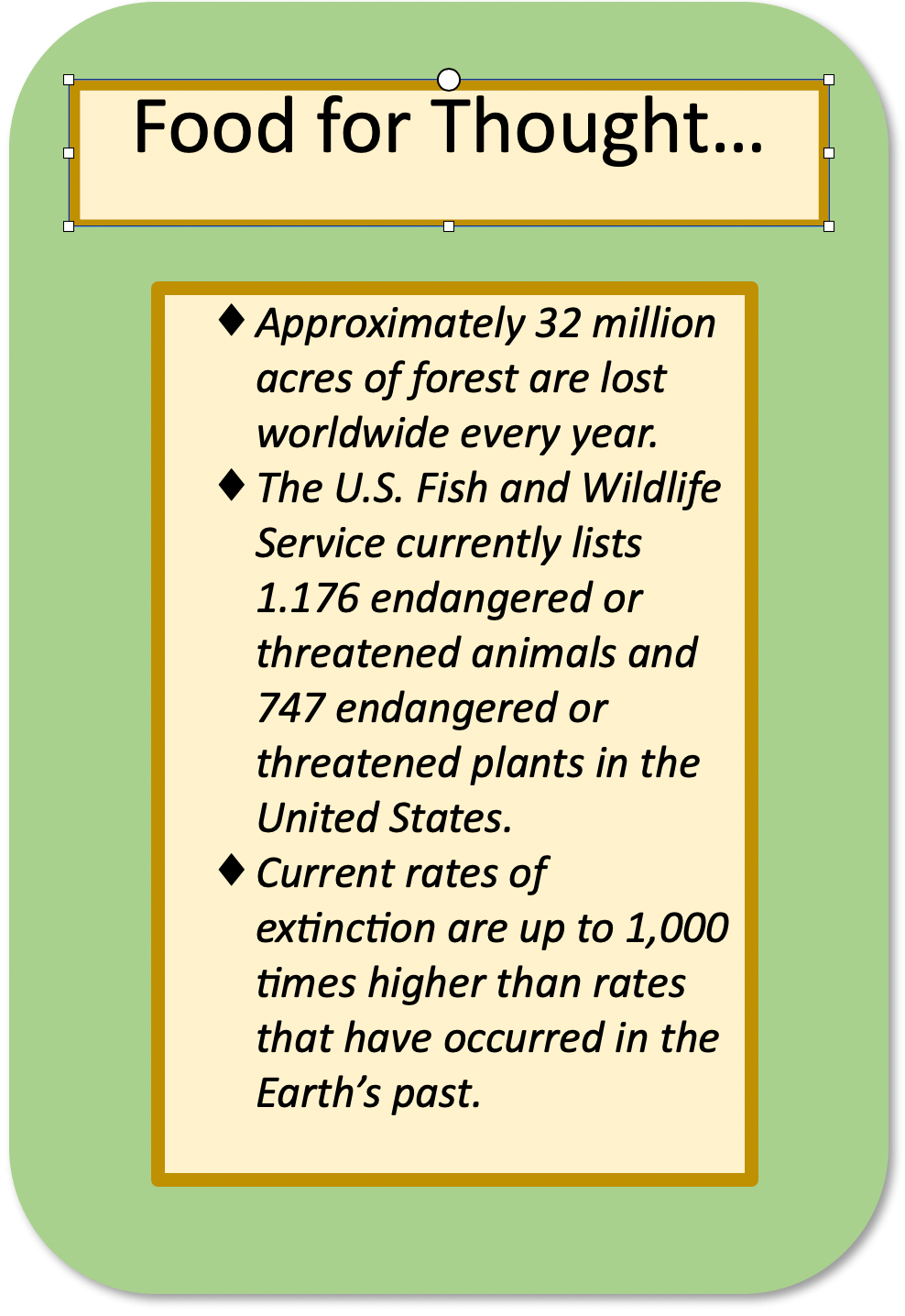
To recognize how the human species is inter-connected with the created world and how dependent we are on it for our continued life and existence is recognizing an astounding truth. For example, take a reflective walk through any supermarket and begin asking yourself where each product comes from (e.g., the bread, cheese, spaghetti, vegetables meat, fish, ice cream, etc.). Then ask yourself how many people are involved in bringing all those products to the shelves of the supermarkets (e.g., farmers, ranchers, fisher people, harvesters, truck drivers, packagers, grocers, shelf stockers, etc.), then you begin seeing in a very small way how interconnected we are with creation around us.
A major area of possible fruitful dialogue between science and religion comes from the mutual concern about the abuse and destruction of countless species and other vital resources of the created world. Unless representatives from both sides come together in common effort to provide information, data, and support for preserving the environment, we will endanger the promise of future sustainable resources for our children and grandchildren and the children and grandchildren of all living species.
It is also becoming clear that the lack of respect for life extending to all forms of creation is almost always to the detriment of the poor, the powerless, and the disenfranchised. They bear the major brunt of our environmental destruction. The Church must speak out on these issues which are religious and frequently moral and ethical. Now it is clear to most scientist and to the Church that human activity is severely damaging our environment – air, land, water, living organisms of various kinds, and animal life – and this degradation is having a profound effect on human life, especially those living in poor communities throughout the world.
Questions for Discussion:
1. Is the Church a key player in the environmental movement today? Should it be?
2. Do you think the issue of the “environment” has become too political and polarized in our times?
3. What do you think are the primary environmental issues that the Church should raise up to the consciousness of the faithful?
Question no. 2: Why is it important for Presentation to be a “Green Parish”?
It is important that the Church of the Presentation be a “green parish” because our parish is the sacred ground where we gather together to hear God’s Word, to break bread together as a family at the Eucharistic table, and to grow into a community of faith. This community acts in response to the promptings of God’s Spirit. It is where we are nourished by the sacraments and animated by a variety of different spiritual and pastoral opportunities. Presentation is our “spiritual centering place,” where we are nurtured and sustained to act with compassion and love for one another and for all creation.
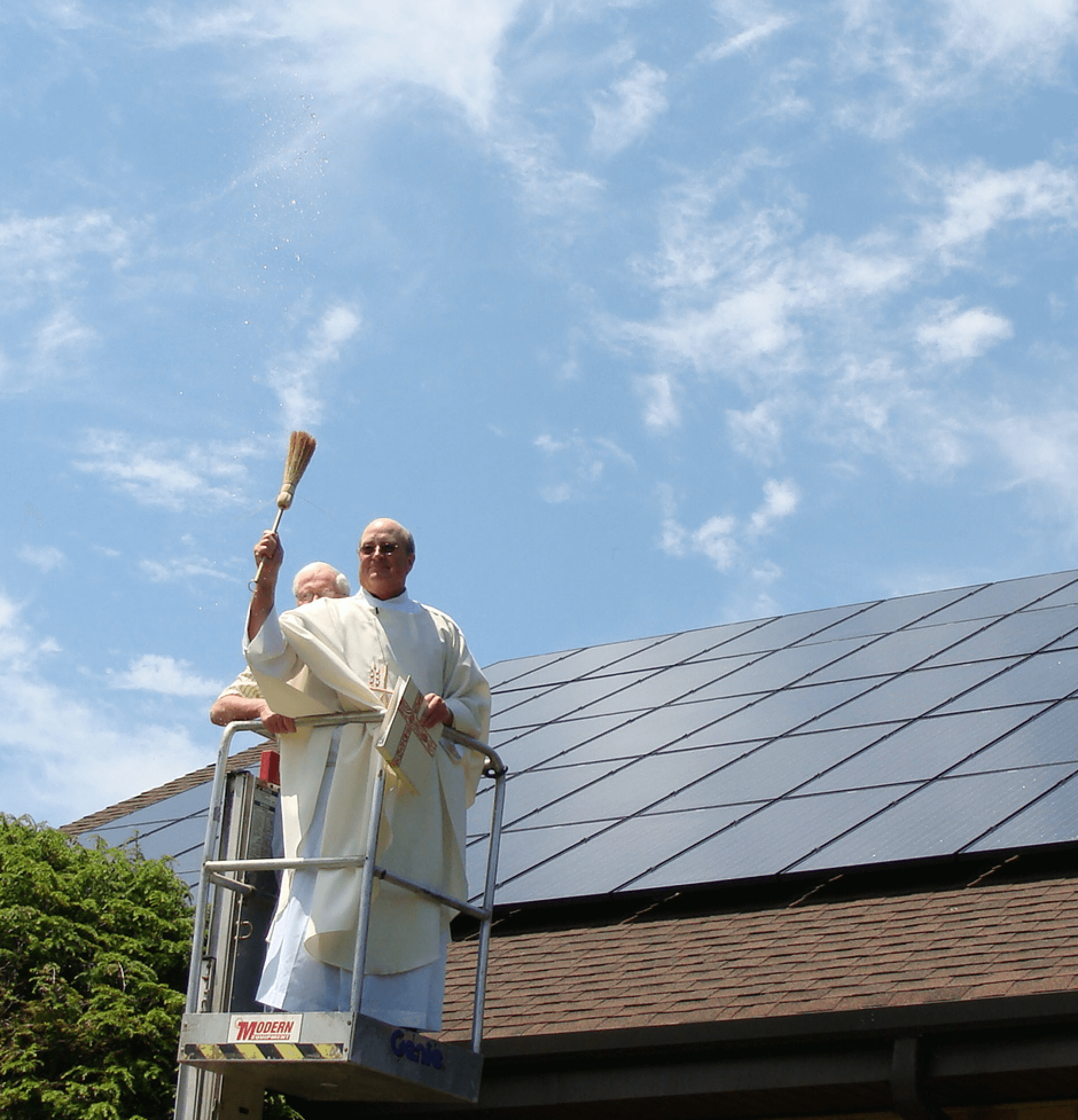
Our parish is a place for us to study, pray, and act in ways that reflect our Catholic values. It, then, is an ideal context for becoming aware of what is happening in our environment and the resultant impact on us, others, and all of creation. Presentation can be a model of how ordinary, concerned people are contributing toward a spirituality of “Caring for the Earth” by doing what we can to make this a healthier, cleaner, and more sustainable world for the future.
We have already taken steps in this direction with the formation of the St. Francis Ministry and, more recently, with the parish participation in the Green Faith Certification Program. Our parish has taken “greening steps” by installing solar panels on the roof of the church providing eco-friendly and energy-efficient bathrooms and providing guidelines for recycling and using more environmentally appropriate materials in our parish life.
Our initiatives toward the “greening” of our parish provides an example or model of what can be done to create a more sustainable future, one which is more consistent with God’s intention for a created world, our home, that was once judged to be “very good.”
Questions for Discussion:
1. What positive values do you see in our parish becoming a “green parish?” What are the challenges?
2. Is raising the consciousness of parishioners about environmental concerns a legitimate Catholic issue? Please explain.
3. How can we improve the effectiveness and outreach of the environmental mission in our parish?

Online Mass /
Mass Schedule
Sunday Mass
Saturday 5pm (also live-streamed)
Sunday 7:30am, 8:30am, 10:00am, 11:30am & 6:30pm
Daily Mass (click here to view)
Mon. – Sat. 9:00am (also live-streamed)
Parish News & Events
Please read about all of our upcoming events in the weekly bulletin.

